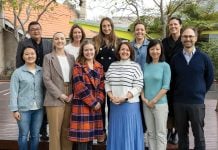A recent Andrew Prentice Seminar saw student musician Jerry Pei (Year 11) collaborate with Biology teacher Cameron Pyle to investigate a musical mystery.
“I used to think research was something only university students did,” says Jerry.
“When the chance to do my own research for the Andrew Prentice Seminar Series came up, I jumped at it.”
A violinist since age 10, Jerry set out to investigate “perfect pitch” – the rare ability to identify and produce musical notes without hearing a reference tone.
He then teamed up with Biology teacher Cameron Pyle, and the two embarked on a collaborative, cross-disciplinary research project.
The gene that could determine our musical ability
Established in 2017, the Andrew Prentice Seminar Series sees students and staff members work together to present on an academic topic of shared interest. With Mr Pyle’s guidance, Jerry refined his research topic to focus on the biology of perfect pitch, which led him to zero in on a specific gene: FOXP2.
“According to La Trobe University researcher Dr Lynne Kelly, FOXP2 could be significant in language production for both humans and animals, and even the slightest mutation could have a detrimental effect,” Jerry explains.
“I explored how this gene is expressed in humans, mice, and songbirds, then focused on studies of zebra finches, which suggested that FOXP2 could have a direct influence on our ability to accurately copy sounds.”
Mr Pyle adds that while he knew very little about the biology of music to begin with, the project presented an opportunity to explore its evolutionary origins.
“I discovered that music has evolved independently in humans, seemingly unconnected to the musicality of other species,” Mr Pyle says.
‘“It turns out that the oldest discovered musical instrument is a Neanderthal flute made from a cave bear femur, dating back 50,000 years.”
A new perspective on science
Jerry says working towards the Seminar Series presentation helped him see that two of his passions shared a clear connection.
“When I started playing music and studying biology, both areas felt disconnected and isolated from my real life,” he explains.
“This experience has opened my eyes to the way the two topics overlap, with something as simple as singing having its origin in chemistry and biology. It’s given me a deeper appreciation for how intricate and unpredictable the world really is.
“The world can’t really be broken down into isolated categories,” adds Mr Pyle.
“The study of science is inherently interdisciplinary, and scientific thinking helps us appreciate how interconnected our world is.”



